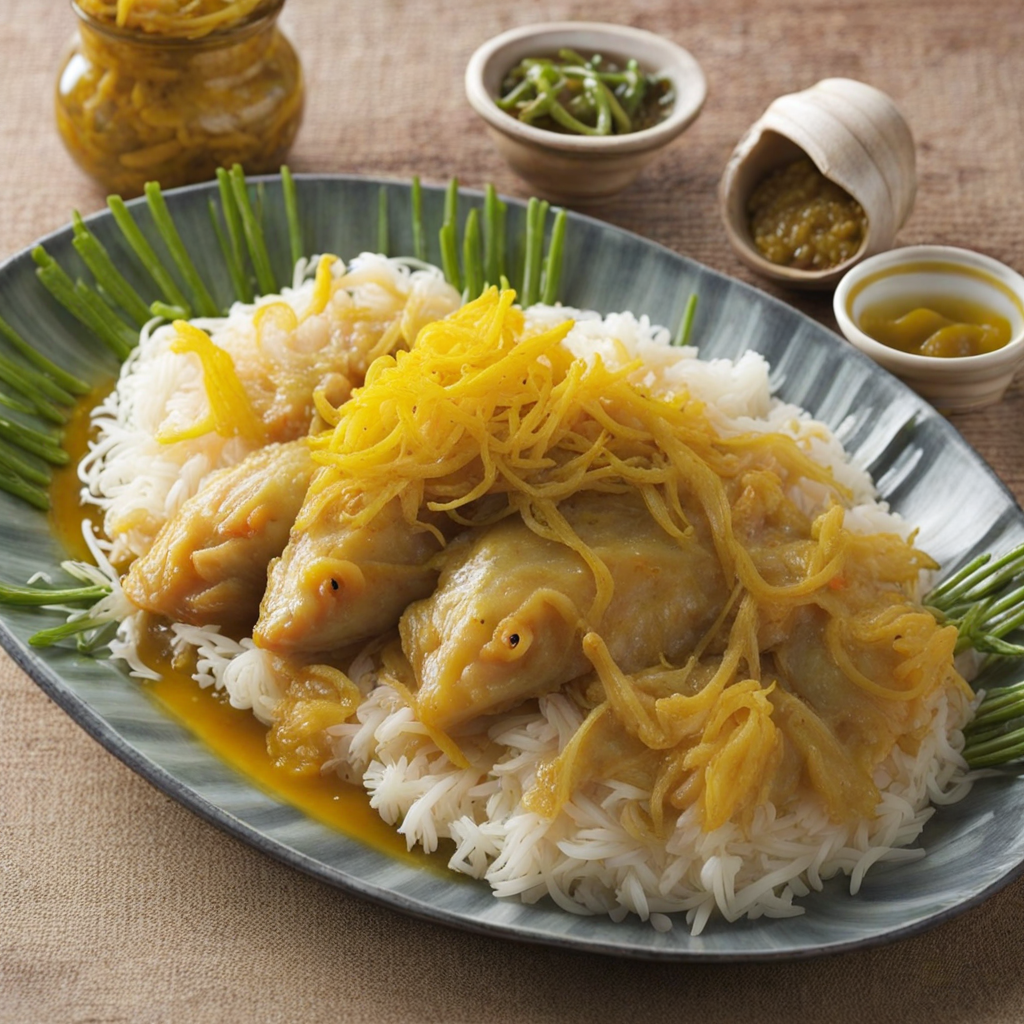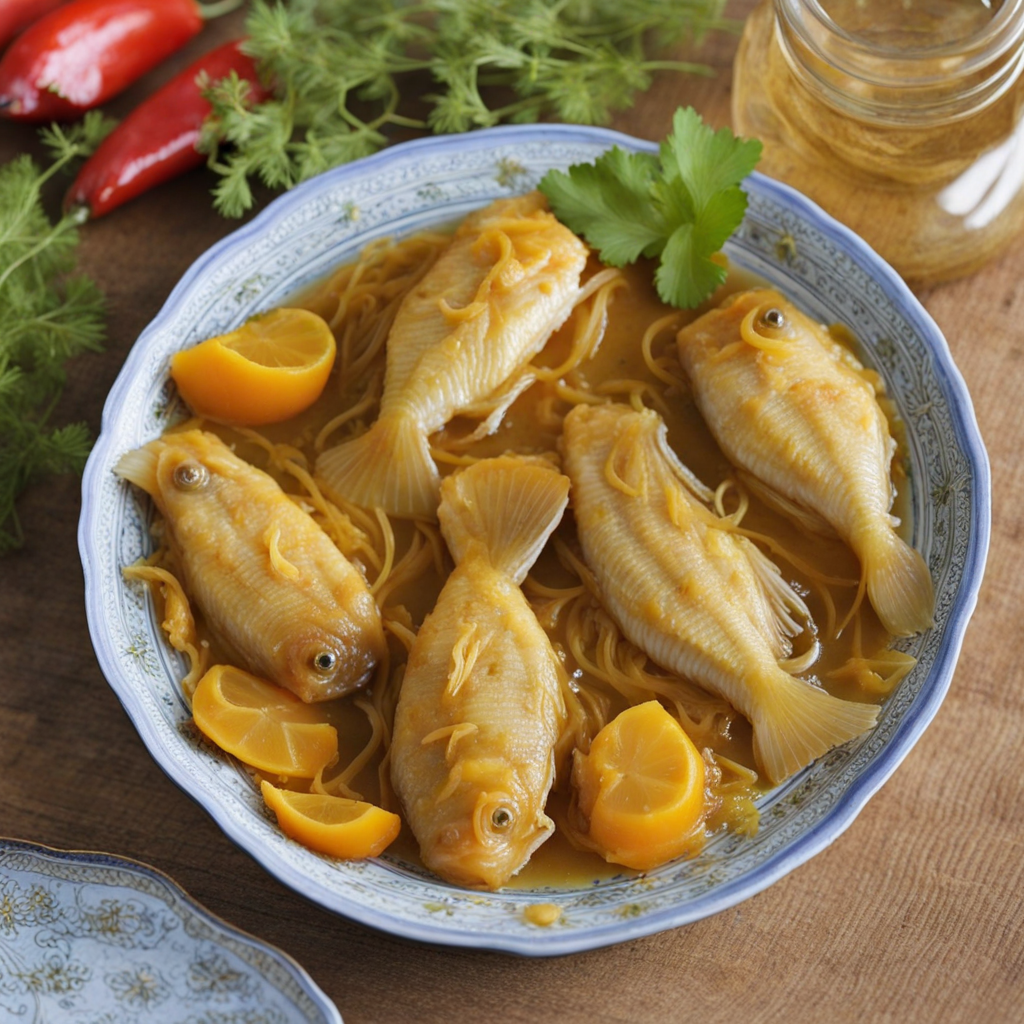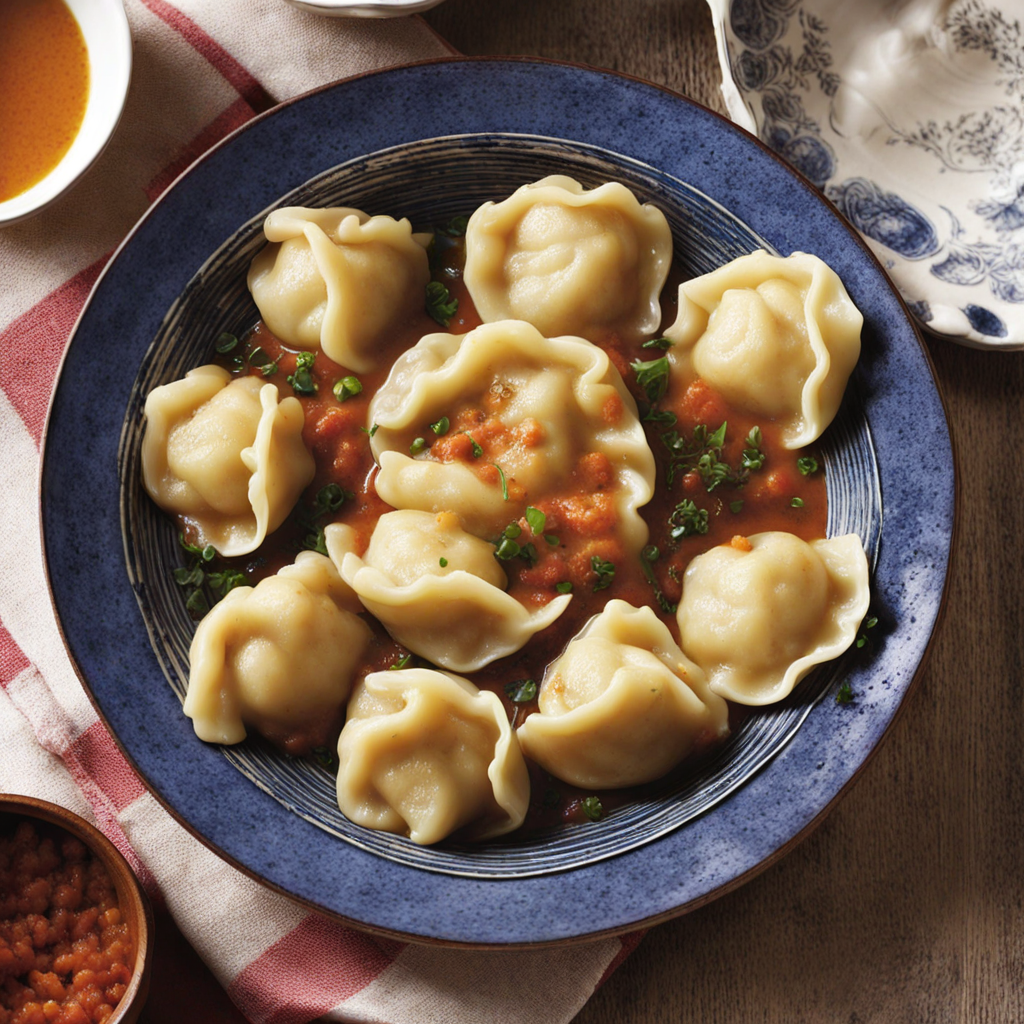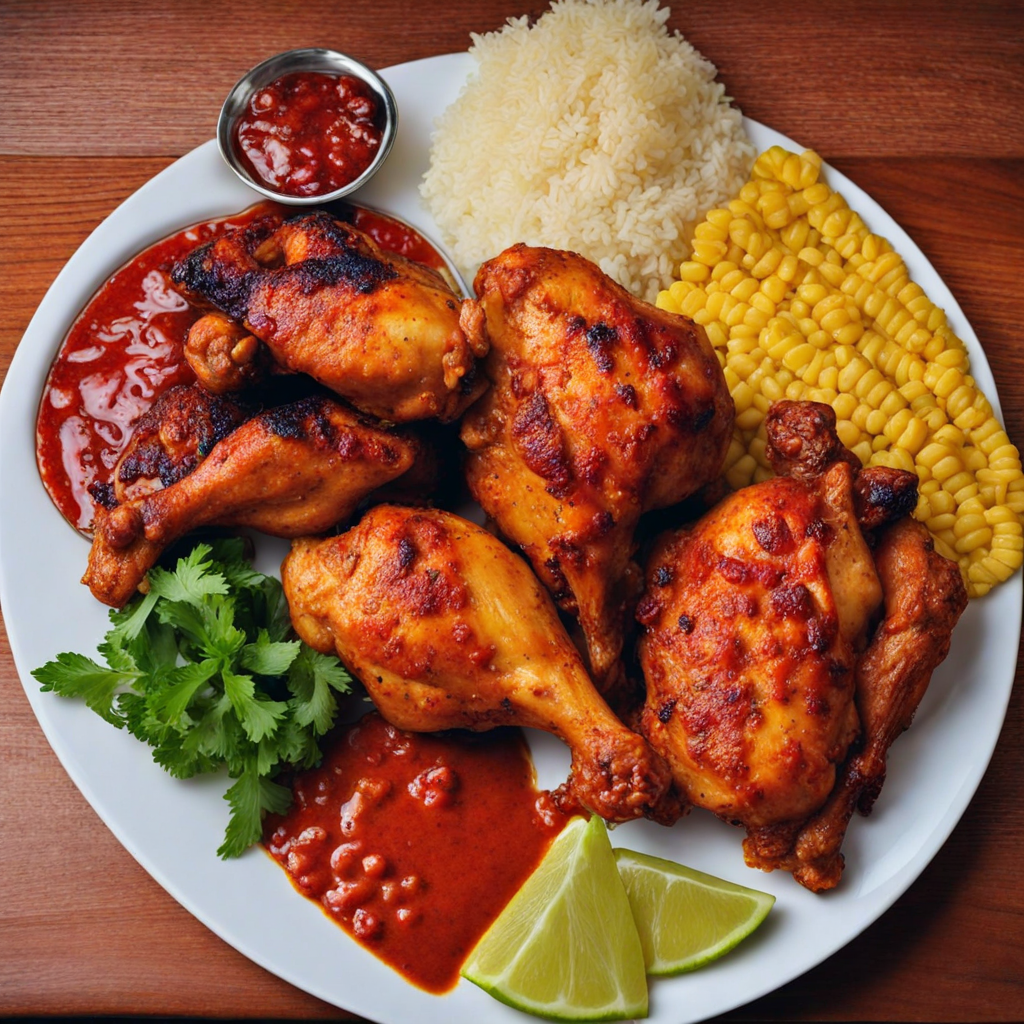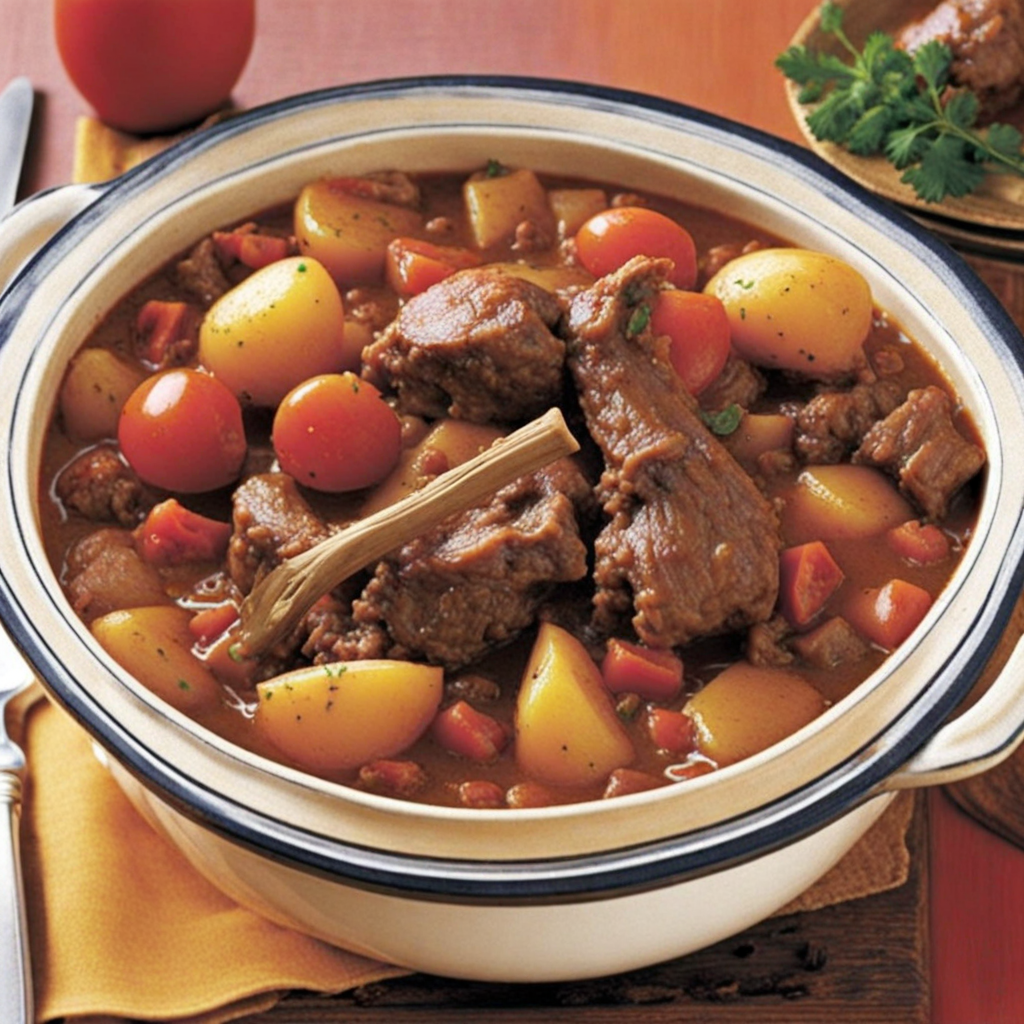Pickled Fish
Pickled fish, a beloved dish in South Africa, is a delightful blend of flavors that encapsulates the country’s rich culinary heritage. This dish typically features firm, white fish such as snoek or hake, which is marinated in a mixture of vinegar, spices, and sometimes sugar. The pickling process not only preserves the fish but also infuses it with a vibrant tanginess that balances beautifully with the natural sweetness of the fish. The spices used—often including turmeric, coriander, and bay leaves—add warmth and depth, creating a complex flavor profile that is both savory and refreshing. Traditionally served during the Easter season, pickled fish is enjoyed as a cold dish, often accompanied by crusty bread or potato salad. The dish's presentation is as appealing as its flavor, with the fish typically sliced into fillets and garnished with colorful onions and peppers that have also been pickled. This not only enhances the visual appeal but also adds a crunchy texture that contrasts with the tender fish. Each bite is a harmonious blend of zesty, sweet, and savory notes, making it a standout in South African cuisine. Pickled fish is not just a dish but an experience, reflecting the coastal communities of South Africa where fishing traditions run deep. It evokes a sense of nostalgia for many, often being a staple at family gatherings and festive occasions. Each family may have their unique recipe passed down through generations, adding to the dish's charm and diversity. For those looking to explore new tastes, pickled fish offers a captivating journey into South Africa’s flavors, celebrating the balance between preservation and the celebration of fresh, local ingredients.
How It Became This Dish
The History of Pickled Fish in South Africa Pickled fish holds a special place in the culinary landscape of South Africa, particularly within the Cape Malay community, where it is not only a beloved dish but also a symbol of cultural heritage. This preserved delicacy, often enjoyed during the Easter period, reflects the rich tapestry of South Africa's history, encompassing influences from indigenous peoples, European settlers, and the diverse array of cultures that have shaped the nation. #### Origins The origins of pickled fish can be traced back to the early days of European colonization in the Cape of Good Hope in the 17th century. The Dutch East India Company established a refreshment station at the Cape in 1652, which attracted various European settlers, including the Dutch, French Huguenots, and Germans. These settlers brought with them their culinary traditions, which included methods of preserving fish. The practice of pickling fish was especially popular among coastal communities, where an abundance of fresh fish awaited. The process of pickling was not only a means of preservation but also a way to enhance flavor. The use of vinegar, spices, and sugar in pickling allowed fish to be stored for extended periods, which was crucial for survival during long sea voyages. Pickled fish was often eaten as a staple food, providing sustenance during times when fresh provisions were scarce. #### The Cape Malay Influence The Cape Malay community, descended from enslaved people brought to the Cape from various parts of Southeast Asia, played a pivotal role in the evolution of pickled fish in South Africa. These communities integrated their culinary traditions with local ingredients, creating unique dishes that reflected their diverse backgrounds. Among them was the art of pickling fish, which became a significant part of their culinary repertoire. Cape Malay pickled fish is characterized by its aromatic spices, including coriander, mustard seeds, and turmeric. The inclusion of onion, garlic, and green chili peppers adds depth to the flavor profile. This dish not only appealed to the palate but also provided a way for the community to express their cultural identity in a land where they often faced marginalization. #### Cultural Significance Pickled fish is more than just a dish; it embodies the spirit of community and tradition. Within the Cape Malay culture, it is especially significant during the Easter period. This time of year marks the culmination of Lent, a period of fasting and reflection for many Christians. On Good Friday, families gather to break their fast with this flavorful dish, which is often served alongside hot cross buns, another Easter staple. The preparation of pickled fish is often a communal activity, with families coming together to create large batches that can be enjoyed over several days. This practice fosters a sense of togetherness and continuity, allowing younger generations to learn and appreciate the culinary traditions of their ancestors. In many households, recipes are passed down through generations, each adding their personal touch while remaining true to the core elements of the dish. Pickled fish also serves as a link to the broader South African narrative of resilience and adaptation. The dish stands as a testament to how marginalized communities have used food as a means of preserving their heritage while simultaneously adapting to new influences. It reflects the diverse cultural landscape of South Africa and highlights the importance of food in storytelling and cultural memory. #### Development Over Time Throughout the years, pickled fish has evolved, reflecting changes in both societal norms and culinary trends. While it remains a beloved dish within the Cape Malay community, its appeal has expanded to include a wider audience. As global interest in South African cuisine has grown, pickled fish has found its place on restaurant menus and in homes across the country and beyond. The basic recipe for Cape Malay pickled fish has remained relatively unchanged, but modern variations have emerged that incorporate contemporary flavors and techniques. Chefs have begun experimenting with ingredients such as fruit juices, different types of vinegar, and even innovative spices, blending traditional practices with modern culinary creativity. This evolution ensures that pickled fish remains relevant in today’s diverse culinary landscape. In recent years, the rise of food tourism has also contributed to the resurgence of traditional dishes like pickled fish. Travelers seeking authentic South African experiences are increasingly drawn to the vibrant flavors of Cape Malay cuisine. This interest has led to the establishment of cooking classes, food festivals, and culinary tours that celebrate the rich history and diverse flavors of South Africa, with pickled fish often taking center stage. #### Contemporary Relevance Today, pickled fish continues to be a cherished dish, particularly during the Easter season, but its significance extends beyond the holiday. It is enjoyed year-round as a versatile appetizer or side dish, showcasing the culinary heritage of South Africa. The dish has also gained recognition in the global food scene, celebrated for its unique flavor profile and cultural narrative. Moreover, pickled fish is emblematic of the growing interest in sustainability and food preservation techniques in contemporary cooking. As discussions around food waste and sustainability intensify, traditional methods such as pickling are being revisited and embraced by new generations of cooks who recognize their value not only in flavor but also in promoting responsible eating practices. #### Conclusion Pickled fish is a remarkable culinary creation that encapsulates the rich history and cultural diversity of South Africa. From its origins in early European colonial practices to its evolution within the Cape Malay community, this dish is a testament to resilience, adaptation, and the enduring power of food in shaping identity. As it continues to evolve and inspire, pickled fish remains a beloved symbol of a vibrant heritage, connecting past and present through the shared experience of food. Whether enjoyed at family gatherings, festive celebrations, or gourmet restaurants, pickled fish is a delicious reminder of the stories and traditions that bind communities together, nourishing both body and soul.
You may like
Discover local flavors from South Africa


